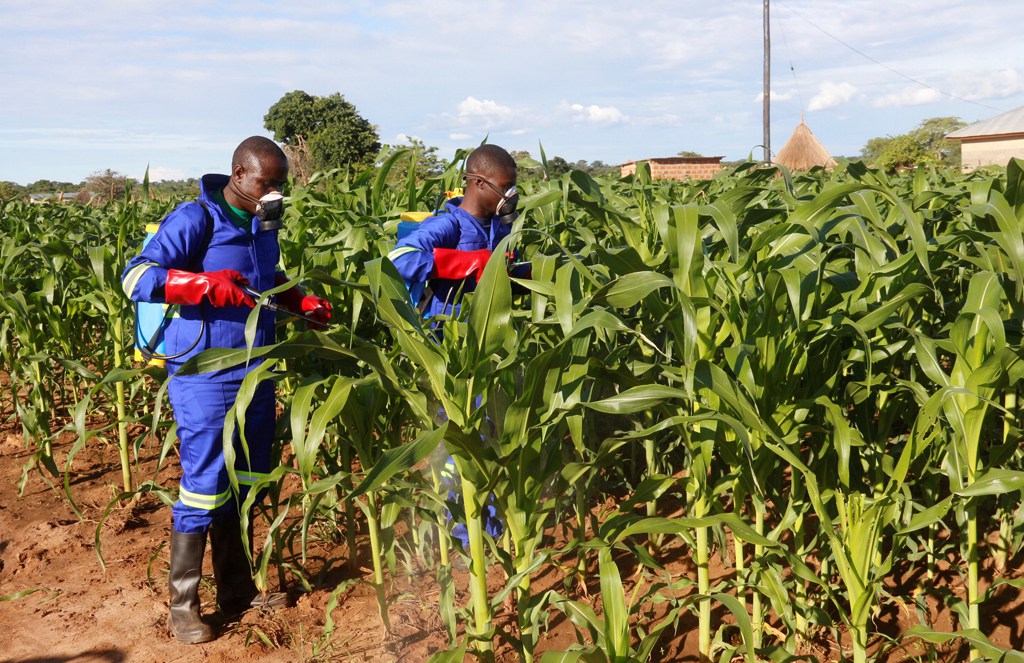Smallholder farmers in Nyamira County are set to benefit from a free farmers training on fall armyworm (FAW) control that is set to take place on December 19th at Ronald Momanyi’s farm in Nyamusi location.
Related content
Africa faces permanent $2bn+ maize deficit if Fall Armyworm poorly managed
Plant extracts show positive results in containing fall armyworm
Experts meet in Nairobi to solve fall armyworm menace in Africa
The fall armyworm is a moth, native to tropical and subtropical regions of the Americas, but it is in the caterpillar stage when it causes damage to crops. It attacks more than 80 plants (food and non-food) including maize, cotton, pear sorghum, rice, tomatoes, cucumber, pastures, onions, kales and spinaches among others. It can cause up to 100 per cent loses if uncontrolled.
As of September 2017, the worm had spread to 28 African countries including Kenya following the pests’ arrival in 2016 in the continent. In 10 of the countries affected (Burundi, Rwanda, Uganda and Kenya amogst others) CABI Africa estimates the combined losses from FAW on maize yield lies between 7.2 and 17.9m tonnes per year and with commercial losses lying between Sh2.2b and Sh5.5b per year.
In this, Nyamira Country farmers could gain from the training which will educate them on the pesticides to use, the procedure to be used in application and other natural control methods.

Farmers spraying their maize to control fall armyworm in Kenya
The fall armyworm was first reported in Western Kenya by farmers in March 2017. It was immediately confirmed by the Kenya Plant Health Inspectorate Service and Kenya Agricultural and Livestock Research Organization. The initial counties infested were Busia, Trans Zoia, Bungoma, Nandi and Uasin Gishu according to a report by the Food and Agriculture Organization (FAO) with the pest destroying70 per cent of the crops affected.
As countries turn to pesticides to reduce the damage, farmers face the risk of the pest developing resistance to treatment, which has become a widespread problem in the Americas.
Biopesticides are a lower risk control option, but few of the biopesticides used in the Americas are yet approved for use in Africa, raising the need for urgent local trials, registration and the development of local production.
“Maize can recover from some damage to the leaves. So when farmers see damaged leaves, it doesn’t necessarily mean they need to control. Research is urgently needed, and a huge awareness and education effort is required so that farmers monitor their fields, and can make decisions on whether and how to control,” said Roger Day, CABI’s SPS Co-ordinator.
“There are natural ways farmers can reduce impact, including squashing the eggs or caterpillars when they see them, and maintaining crop diversity in the farm, which encourages natural predators.”
According to CABI African governments should coordinate responses and advise farmers on identification, damage and control. They should also regularly review and update on recommendations to be taken.
To control this pest, farmers should plant early and adhere to regional planting calendar by avoiding late and off-season planting. Avoid planting new crop near infested plants and use recommended fertilizers. Farmers should also keep fields weed free to boost plant vigor.
Mass trapping should be done by setting up 4-6 FAW Pheromone traps per ha to suppress the moth population.
The potential effective insecticides against this pest include: Diazinon, Alpha Cypermethrin, Chlorpyrfos, Diflubenzuron Triclorfon (Dipterex), Chlorantraniliprole, Spinetoram, Emamectin benzoate, Indoxacarba and Lambda Cyhalothrin.
For effective control in maize, spray at least three times starting two weeks after emergence, at knee high and just before tasseling. However these products need to be used appropriately at right environmental conditions to minimize development of pest resistance. All farmers in a given locality should spray to avoid neglected farms, which become breeding grounds for the insect and a source of re- infestation.
Farmers are discouraged from moving infested plant materials to areas where the pest has not been reported because it may increase chance of infection to other plants.
The training will be held courtesy of Murphy chemicals ltd who are seeking to enlighten farmers on how to control the deadly worms.
















Comments powered by CComment